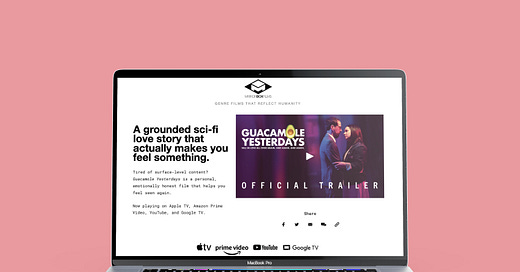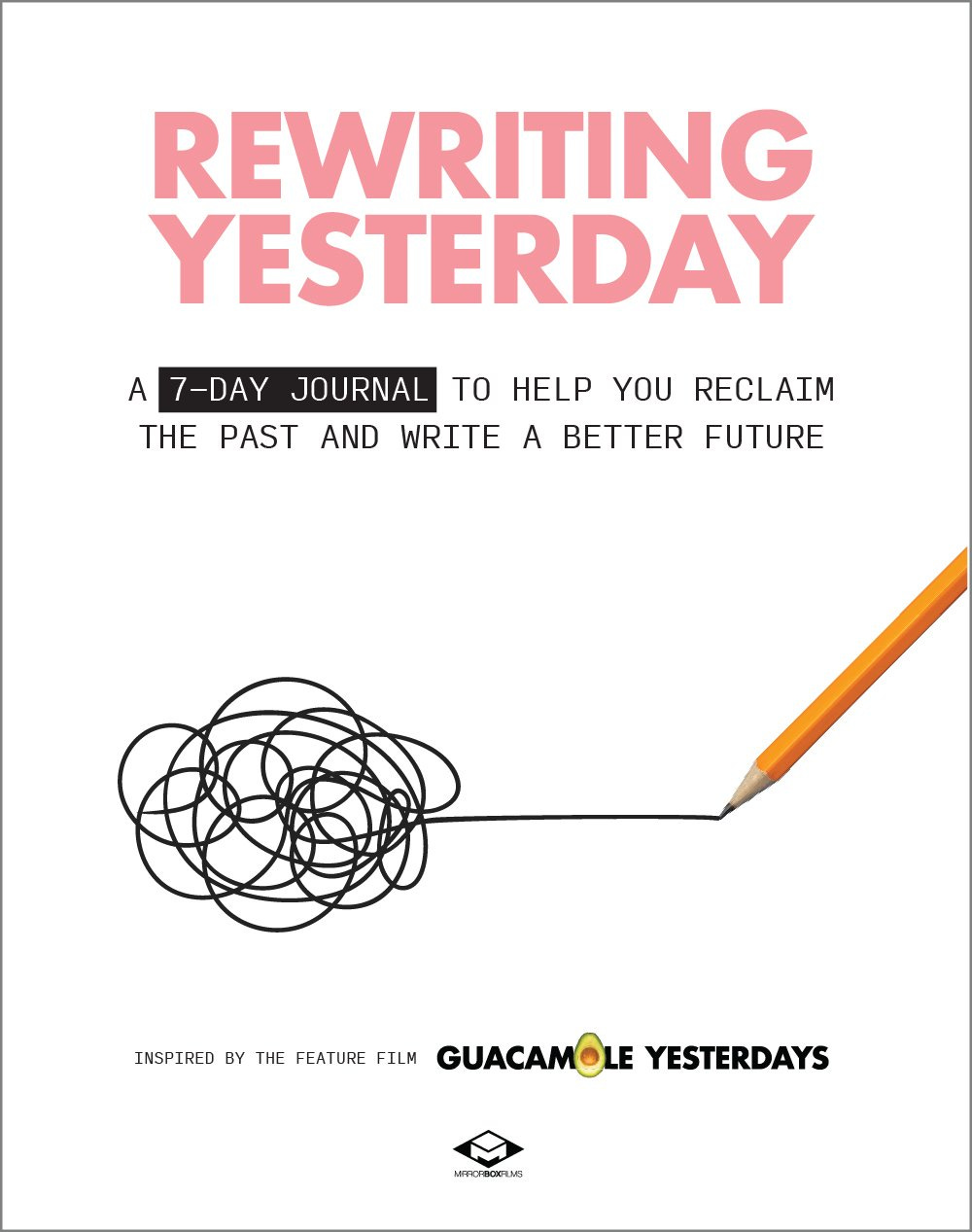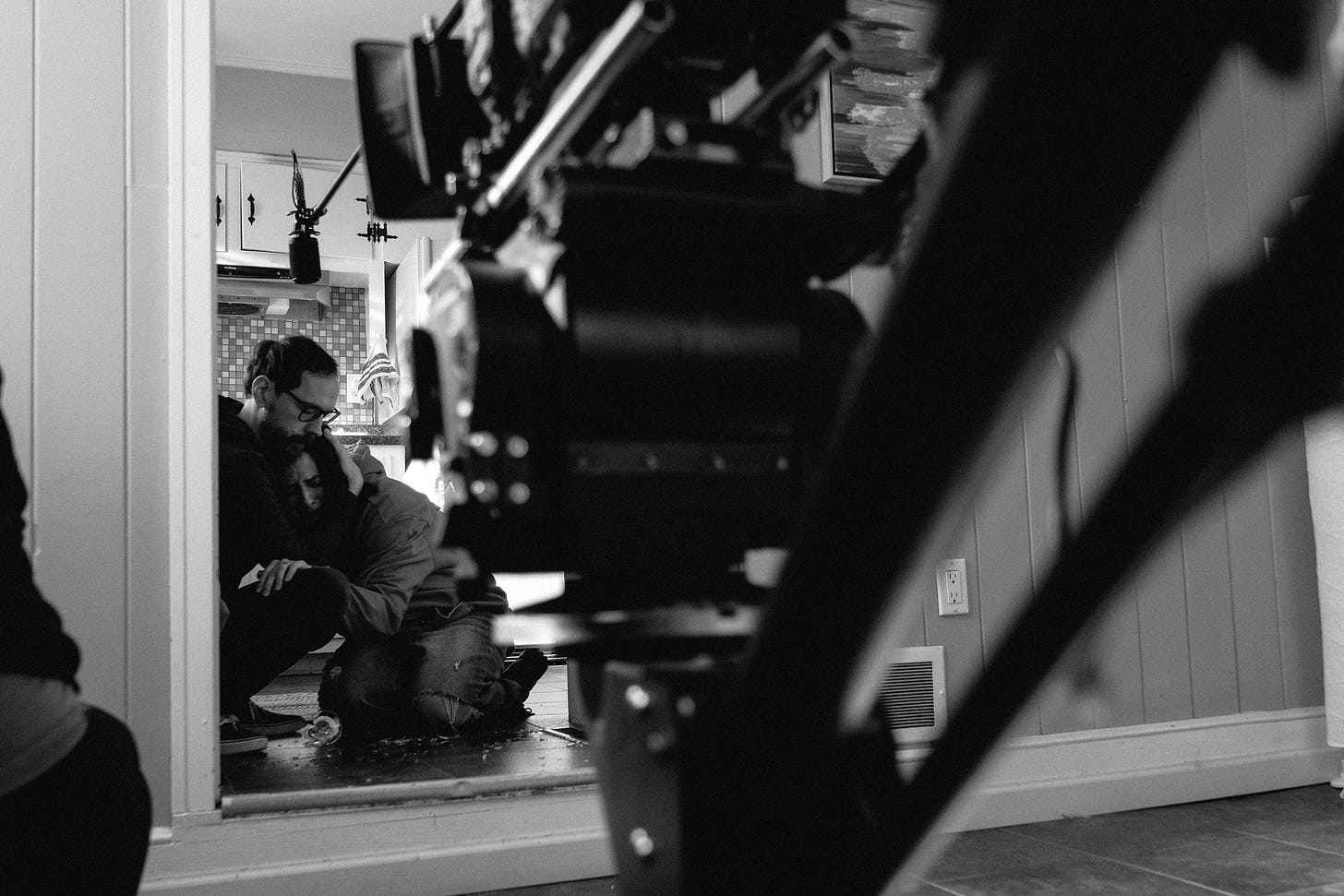How We Rebuilt Our Film’s Website by Listening to Our Audience
Why indie film marketing doesn’t have to feel like selling your soul.
After our new feature film, Guacamole Yesterdays, had been out for a few days, I woke up one morning with the horrifying thought:
“Oh my god our website sucks!”
Now, here’s the thing. My day job is creating websites. I’m a graphic designer, copywriter, and marketing consultant, mostly in the speaker/author space. I’m certainly not a master at any of these things, but I have a good idea of what works and what doesn’t. I love helping clients find their voice and putting a megaphone on it.
So why was it so hard to do this for myself? I’ve found that the closer you are to something, the harder it is to sell it. This is why marketing firms exist. They can go in and see your product as your potential audience sees it. I was too “in the weeds” to see that our website was a stinker.
We’re running ads to the site as part of a marketing campaign, and initially it was just a trailer and some links. Inspired by the simplicity of A24 (a company so established that they don’t need a compelling website), I somehow forgot everything I knew about marketing.
The Indie Filmmaker’s Other, Other Job
As filmmakers, we love making movies. We know how to tell a story, how to motivate a crew, how to get great performances, and how to edit a bunch of random things into a compelling story. But indie filmmaking today requires a whole new particular set of skills that most of us (Liam Neeson included) don’t have, including:
Accounting (please, no one ask for a Substack on this). Distribution. And, yes, marketing.
A lot of filmmakers don’t have to learn these things because they have people or teams to do this for them. But for indie filmmakers at our scale, we can’t afford to bring on even one of these people, much less a whole team.
It takes learning new skillsets that we’re uncomfortable with.
So, with that in mind, I wanted to share some thoughts on marketing as an indie filmmaker and walk through the process we went through in updating our website.
Rethinking the Marketing Mindset
Here’s the good news:
Marketing is just storytelling.
You already have the skills to be a successful marketer; you just need the right mindset.
Jordan, our director, hates even hearing the word “marketing.” As a “pure artist” (my description, not his), he doesn’t want anything to do with it. He wants to create art, and if it finds an audience, great. If not, that’s okay too. The art is the point.
And I love that mindset.
Buuuuut, as the producer, I have to keep an eye on pesky things like bottom lines because if I don’t, we unfortunately don’t get to keep making art.
A Story-Driven Approach to Indie Film Marketing
Marketing doesn’t have to be sales-y. It doesn’t have to be icky. You are proud of your art, and you want to share it with as many people as possible, right?
Marketing is just an extension of you as a storyteller:
A trailer should set the tone for your audience so they don’t feel swindled.
Social media should be about building personal relationships.
Online ads should inspire people, not sell to them.
A website should tell the story, not of your film, but of your audience’s journey.
The same skills that you use to tell a great story are the exact same skills you use to market your film.
At its core, a story is:
A character who wants something, overcomes conflict to get it, and changes internally as a result.
The reason this works as an outline for a great story is that it’s an outline for a great life. We all know what it’s like to want something, overcome conflict, and go through a change. This is why the character journey is so relatable on screen.
But what if you applied this same kind of thinking to your marketing materials?
Let’s take it one beat at a time:
“A Character” = Who is your audience?
Hopefully, this is a question you answer before you even start writing your film. But, for most of us, we aren’t thinking through that lens; we are just passionate about a story. We have to find it afterwards.
“Fans of A24 movies” was one of the demographics in our pitch deck. But this is a horrible demographic because it tells me nothing about an actual person.
So we started thinking more specifically. Our film explores the ups and downs of the creative journey for a comedian (our male lead) and a comic book artist (our female lead). It also explores how therapy can help us process past heartbreak and navigate complicated relationships. That helped us think more clearly about who the film might really resonate with:
Struggling artists.
Individuals interested in therapy.
Couples looking for answers.
“Who Wants Something” = What do they want?
We believe that films have the power to heal. Not by providing pat answers to life’s problems, but by presenting those problems with honesty and transparency. When we see ourselves reflected on screen, we find healing just through knowing we aren’t alone.
And I think the core audience of Guacamole Yesterdays is looking for those kinds of experiences. They want a film that makes them feel something. That makes them feel seen.
“Overcomes Conflict” = What is standing in their way?
As filmmakers and film lovers, we all desperately seek out transformative stories. But in a world of algorithm-driven, created-by-committee, I.P.-obsessed modern blockbusters, this is sorely lacking.
Audiences are craving something deeper than just distraction, especially in today’s divisive climate, but don’t feel like Hollywood-produced fare is fitting the bill.
“To Get It” = How can you help them overcome it?
We take a human-first approach to filmmaking. This is why the festival and in-person tour approach was so important to us. It also means that each step of the filmmaking process had us thinking about the audience. We want to evoke a feeling. We want audiences to leave the theater (or couch) still thinking about it days later. We want to dive deep into themes that help us embrace our emotions, not just escape them.
Guacamole Yesterdays provides an answer to their struggle.
Not only do we provide the movie for them to watch, but we even have a free download on the site titled Rewriting Yesterday: A 7-Day Journal to Help You Reclaim Your Past and Write A Better Future to help them unpack their complicated relationship with the past.
“Changes Internally” = What is the result?
When audiences experience the film, they feel seen and heard. They see themselves reflected on screen. They find healing from their own struggles and issues. They feel challenged. They feel changed.
Not everyone who watches connects with it on such a deep level, but for those who do, they look at life a little bit differently.
Our Audience Wrote the Copy for Us
When I set out to rethink our website, I started with these five questions, but instead of just guessing at the answers, I fished through the dozens of reviews we’ve gotten following our festival run and theatrical tour. I wanted to learn about our audience’s journey in their own language:
“It made you feel something, which is what movies are for. And it’s something that we are missing in the film world right now.” — Ciana, audience member
“I have never felt personally connected to a film quite like I do with Guacamole Yesterdays. It was as though snippets of my life were replaying before my eyes.” — Wink, audience member
“I stumbled across this film playing at my local art theater, and honestly, it felt like fate. Thought-provoking and emotionally moving. I laughed, cried, and soaked in all the details.” — Yvonne, audience member
This started to give us a very clear picture of who our audience was, what they were looking for, and how the film helped them find it.
You’re Not the Hero
Here’s the thing that’s so easy to forget when you’re marketing your film:
You are not the hero of this story. You are the guide helping the hero achieve their goal.
When we look at marketing as “sales,” we’re saying “we have this great thing! Pay attention to us!” but no one wants to feel sold to. Just like the characters you write in your scripts, audiences are the hero of their own stories. The only way to convince them that your film is worth their time is to provide something that they’re already looking for.
What problem does your movie help them solve?
Take a look at the five questions above and answer them for yourself.
Want to see how we Mr. Miyagi’d our answers into a finished website?
Take a look at guacamoleyesterdays.com.
I’d love to know your thoughts on what you think is working or where we might’ve missed the mark. It’s a work in progress, and we’re learning as we go.
P.S. A lot of this thinking is influenced by Donald Miller’s StoryBrand, a marketing framework that helps businesses treat their audience as the hero and their product as the guide.
P.P.S. If you're a filmmaker trying to figure out how to share your story without selling your soul, I hope this helped. Let me know if you'd want me to dive deeper into this kind of stuff in future posts!
Experience the film for yourself.
Guacamole Yesterdays is now available to rent or buy on Apple TV, Amazon Prime, YouTube, and Google TV.
Watch it here: guacamoleyesterdays.com







